|
January 12, 2014
from
DeepCor
Website
This is important as the advancements in technology help keep the people level with large corporations and governments, because after all knowledge is power.
Recently however, more and more attempts have been made by governments working on behalf of large corporations to censor and limit who is able to provide information and content available on the Internet.
There are numerous examples of this censorship,
e.g. the obvious
SOPA bill that was unsuccessfully pushed
through the legal system of the USA, the legal issues regarding the
well-known website "The
Pirate Bay" (TPB) in Sweden, which one may add hosts no illegal
content but merely acts as a search engine in much the same way as
Google, and finally the well-known censorship of the TPB website in the
United Kingdom.
The PIPCU is a section of the City of London Police that works as an enforcement arm for various private organizations such as,
The way they operate, and arguably their existence, is both worrying and should set off warning bells in any Internet userís head.
"Intelligence" is gathered by private investigators that work for organizations such as the BPI and FACT and forwarded to the PIPCU.
The PIPCU then directly contact the DNS registrar of the website in question and request that the website be redirected to a website of the private investigatorís choice. With neither evidence nor legal authority provided, the PIPCU threaten the DNS registrar so that they will be reported to ICANN, the international body that grants the ability to DNS registrars to register domain names.
They quote a section of ICANNís registrar accreditation agreement which states that the registrar must respond to legal requests, and call the owner of the website in question a "criminal".
Both of these are wrong. The letter or "request" sent by the PIPCU is not a legal request. It has no legal weight, as it has not passed through a court, nor are the website owners criminals as they have not been deemed of committing a crime by a court of law.
The PIPCU are also working with "financial institutions" presumably on the same premise to freeze the funds of website owners who are posting information certain corporations deem unwanted.
It is very hard to defend the actions of PIPCU, mainly due to them ignoring the court system.
If they were legitimately shutting down illegal websites then that has to be a good thing. The point, however, has to be that this is not what they are doing. It is not their job nor in their jurisdiction to decide whether or not a website is illegal; it is in fact the courts.
The job of the police is to uphold the laws set out by the court and to provide evidence and information in order for courts to make discussions.
People are not guilty of a crime when they are arrested or charged. They are guilty of a crime once a court has found them guilty. Only then can the punishment or sentence be given.
To look at this another way, what would be the reaction of the public to a police officer arresting someone on the street, finding them guilty on the spot of a crime and sentencing them to prison. One can only presume not a good one.
The PIPCU are simply using their assumed authority to bully and threaten companies into taking action requested by other companies. This is corporate corruption of a police force with massive implications that could lead to terrible outcomes.
Regardless of the legality of the websites taken down, the actions and methods used by the PIPCU are what should the focus in a situation such as this.
Bypassing checks and balances, such as the court system, that were put in place for a reason should be questioned and we are the only people who can question issues such as this.
|

